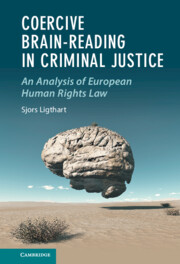Crossref Citations
This Book has been
cited by the following publications. This list is generated based on data provided by Crossref.
Muñoz, José M.
and
Marinaro, José Ángel
2023.
Neurorights as reconceptualized human rights.
Frontiers in Political Science,
Vol. 5,
Issue. ,
Ligthart, Sjors
Tesink, Vera
Douglas, Thomas
Forsberg, Lisa
and
Meynen, Gerben
2023.
The Normative Evaluation of Neurointerventions in Criminal Justice: From Invasiveness to Human Rights.
AJOB Neuroscience,
Vol. 14,
Issue. 1,
p.
23.
Geukes, S H
Bijlsma, J
Meynen, G
Raemaekers, M A H
Ramsey, N F
Simon Thomas, M A
van Toor, D A G
and
Vansteensel, M J
2024.
Neurotechnology in criminal justice: key points for neuroscientists and engineers.
Journal of Neural Engineering,
Vol. 21,
Issue. 1,
p.
013001.
Bublitz, Jan Christoph
2024.
What an International Declaration on Neurotechnologies and Human Rights Could Look like: Ideas, Suggestions, Desiderata.
AJOB Neuroscience,
Vol. 15,
Issue. 2,
p.
96.
Adomaitis, Laurynas
and
Grinbaum, Alexei
2024.
Neurotechnologies, Ethics, and the Limits of Free Will.
Integrative Psychological and Behavioral Science,
Vol. 58,
Issue. 3,
p.
894.
2025.
The Cambridge Handbook of the Right to Freedom of Thought.
p.
95.
Schleim, Stephan
2025.
Brain Development and the Law.
p.
141.
Ligthart, Sjors
and
van de Pol, Naomi
2025.
The Cambridge Handbook of the Right to Freedom of Thought.
p.
350.
2025.
The Cambridge Handbook of the Right to Freedom of Thought.
p.
1.
O’Callaghan, Patrick
and
Shiner, Bethany
2025.
The Cambridge Handbook of the Right to Freedom of Thought.
p.
3.
2025.
The Cambridge Handbook of the Right to Freedom of Thought.
p.
303.
Hertz, Nora
2025.
The Cambridge Handbook of the Right to Freedom of Thought.
p.
112.



